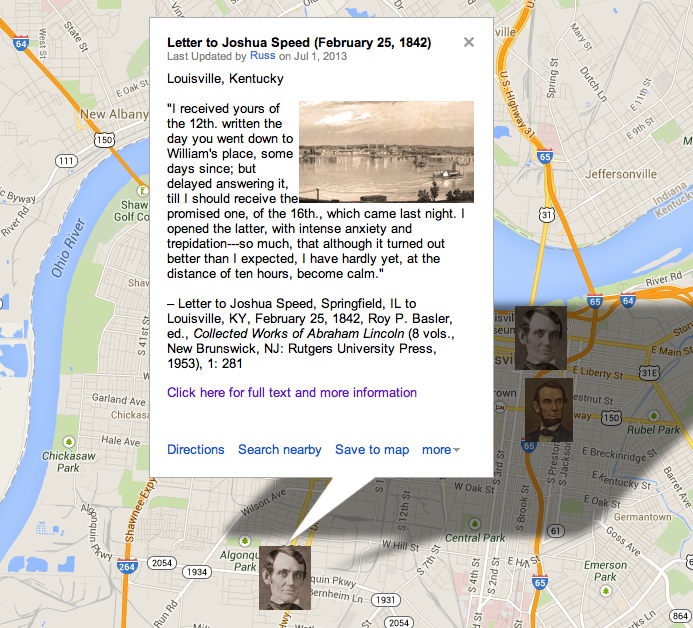Ranking
#78 on the list of 150 Most Teachable Lincoln Documents
Annotated Transcript
On This Date
HD Daily Report, February 25, 1842
The Lincoln Log, February 25, 1842
Custom Map
How Historians Interpret
“As the day of Speed’s wedding approached, Lincoln became agitated. On February 15, 1842, despite his misgivings, Speed married Fanny Henning, prompting Lincoln to write yet another revealing letter. When Speed wrote him shortly after the ceremony, Lincoln opened the envelope, as he later reported, “with intense anxiety and trepediation – so much, that although it turned out better than I expected, I have hardly yet, at the distance of ten hours, become calm.” With relief he told Speed, “our forebodings, for which you and I are rather peculiar, are all the worst sort of nonsense.” Speed confided his fear that the Elysium of which he had dreamed “is never to be realized.” Lincoln reassured him that “it is the peculiar misfortune of both you and me, to dream dreams of Elysium far exceeding all that any thing earthly can realize. Far short of your dreams as you may be no woman could do more to realize them, than that same black-eyed Fanny. If you could but contemplate her through my immagination, it would appear ridiculous to you, that any one should for a moment think of being unhappy with her. My old Father used to have a saying that ‘If you make a bad bargain, hug it all the tighter’; and it occurs to me, that if the bargain you have just closed can possibly be called a bad one, it is certainly the most pleasant one for applying that maxim to, which my fancy can, by any effort, picture.”Here Lincoln seemed to be telling himself that he should not be disappointed if Mary Todd did not measure up to his unreasonable ideal and that he should marry her even if the engagement was a ‘bad bargain.'”
— Michael Burlingame, Abraham Lincoln: A Life (2 volumes, originally published by Johns Hopkins University Press, 2008) Unedited Manuscript by Chapter, Lincoln Studies Center, Volume 1, Chapter 6 (PDF), 546-565.
“This was the consummation letter. Speed got married on February 15, and clearly he had promised Lincoln that as soon as he possibly could after consummating his marriage he would write to report on its outcome. Speed, it seems, had barely tumbled out of his wedding bed on the morning of February 16 before he wrote Lincoln, who opened the letter with ‘intense anxiety and trepidation.’ In fact, even though ‘it turned out better than I expected’ Lincoln was still not calm ‘at the distance of ten hours.’ That is a long time for a man, then thirty-three years of age, to be experiencing such anxiety from the news of how his friend’s wedding night turned out.”
— Charles B. Strozier, Your Friend Forever, A. Lincoln: The Enduring Friends of Abraham Lincoln and Joshua Speed (New York: Columbia University Press, 2016), 185.
NOTE TO READERS
This page is under construction and will be developed further by students in the new “Understanding Lincoln” online course sponsored by the House Divided Project at Dickinson College and the Gilder Lehrman Institute of American History. To find out more about the course and to see some of our videotaped class sessions, including virtual field trips to Ford’s Theatre and Gettysburg, please visit our Livestream page at http://new.livestream.com/gilderlehrman/lincoln

